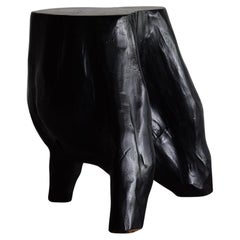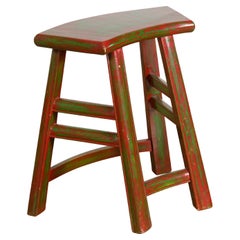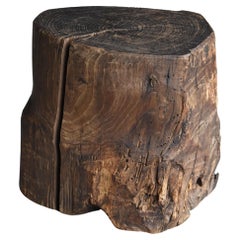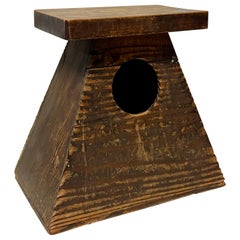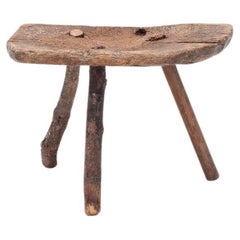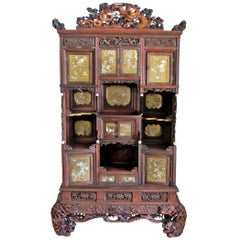Meiji Stools
From 1868 to 1912, Emperor Mutsuhito oversaw an era of transformation in Japan. Formerly a country of feudalism and isolation, Japan entered an age of modernization influenced by newly established trade and exchange with the West. The Meiji period, or period of “enlightened rule,” also saw the global impact of the East Asian country’s culture. Japanese Meiji furniture was exhibited at expositions from Paris to San Francisco and created for export.
Prior to the Meiji era, furniture was mostly made by commission for the ruling class; now there were new domestic and international markets. European styles like Japonisme appropriated Japanese design while craftsmen in places like Wales and England employed japanning, a varnishing technique that approximated the appearance of lacquer for the surfaces of furnishings.
Meiji furniture made for Japanese homes and buildings constructed in Western styles resulted in taller tables, chairs, cabinets with large drawers and other features. The government invested in areas such as transportation and communication, and because people could freely choose occupations after the restrictions of feudalism, industries of various types were energized by expressive new ideas during those years. Art schools were formed and, for the first time, design was an area of study in the country, leading to the evolution of professional design as a career by the 1890s.
The work of Japanese designers was transmitted widely through lavishly illustrated pattern books that included designs for screens and lacquerware for the home. While screens today may be of use as decorative accents or partitions to ensure privacy in one’s space, Japanese screens were adorned with paintings and were featured in performing arts such as concerts, tea ceremonies and more. The color illustrations that characterize Meiji woodblock prints, a genre of Japanese art that grew out of 17th-century developments in printing and book publishing, depicted the sweeping changes that the era brought to East Asia.
Although it was a time of societal and cultural shifts, a bolstered interest in art and design elevated Japanese craft traditions. From colorful porcelain table lamps with silk shades and hardwood tables decorated with dark lacquer to cabinets featuring iron hardware and inlaid with mother-of-pearl, Meiji furniture showcased Japan’s artistic heritage to the world.
Find a collection of antique Japanese Meiji period case pieces and storage cabinets, decorative objects, wall decorations and more furniture on 1stDibs.
Early 20th Century Japanese Meiji Stools
Wood, Cedar
Early 20th Century Japanese Meiji Stools
Wood
Early 20th Century Japanese Meiji Stools
Chestnut
Early 20th Century Japanese Meiji Stools
Wood
19th Century British Antique Meiji Stools
Wood
19th Century Japanese Antique Meiji Stools
Mother-of-Pearl, Wood
21st Century and Contemporary Croatian Meiji Stools
Wood, Oak
Early 20th Century French Meiji Stools
Pine
20th Century European Meiji Stools
Wood
21st Century and Contemporary Croatian Meiji Stools
Wood, Oak
Late 20th Century Asian Meiji Stools
Palmwood
Early 20th Century Meiji Stools
Wood
1930s French Vintage Meiji Stools
Oak
1910s French Vintage Meiji Stools
Wood
Mid-20th Century Japanese Meiji Stools
Cedar
21st Century and Contemporary Croatian Meiji Stools
Wood, Oak
Early 20th Century Japanese Meiji Stools
Chestnut
Early 20th Century Japanese Meiji Stools
Wood
Early 20th Century Japanese Meiji Stools
Wood
19th Century Japanese Antique Meiji Stools
Cedar
Early 20th Century Japanese Meiji Stools
Cedar
Early 20th Century Japanese Meiji Stools
Walnut
Late 19th Century Japanese Antique Meiji Stools
Cedar
Early 20th Century Japanese Meiji Stools
Wood
Early 20th Century Japanese Meiji Stools
Wood
Early 20th Century Japanese Meiji Stools
Wood
Early 1900s Japanese Antique Meiji Stools
Cedar
Early 20th Century Japanese Meiji Stools
Cedar
